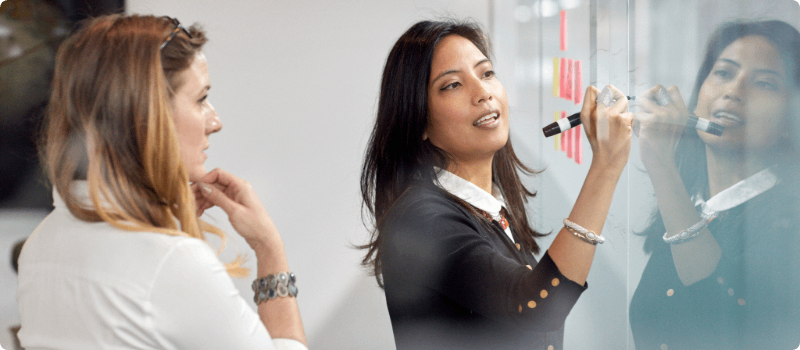Top 10 Interview Questions
Updated September 4, 2021 . AmFam Team
Congratulations! Your impressive background landed you the interview, so what’s next?
With today’s range of workplace dynamics and hiring objectives, not even a crystal ball could predict exactly what an employer might ask during a job interview, but there are some common questions you can expect.
By knowing what these questions are — and how to answer them — you’re likely to shine just as bright in person (or virtually) as you did in your resume.
Keep reading to find 10 of the most common interview questions along with examples of good answers, so you can put your best foot forward.

Top Interview Questions and Answers
The job market is competitive, and no one enters a competition without preparing. Before your big interview, use this list of common interview questions to help anticipate what you might be asked and how to provide good answers. Of course, you won’t want to memorize your responses, but a little practice can help you sound — and feel — confident and prepared.

1. Tell Me About Yourself
Almost every interviewer starts the conversation with some version of “tell me a little about yourself,” so be ready for it with the goal of making a good first impression. Although the question is straightforward, it does require a focused response. Hiring managers aren’t looking for a lengthy narrative. It might help to frame your response around brief past, present and future highlights of your professional life.
Example answer: “After I graduated from college, I started working as a marketing coordinator for an agency specializing in the travel and hospitality industry. Initially, my primary responsibility was to assist with social media strategy and email newsletter production for a couple of key clients. More recently, my role has expanded to helping develop digital marketing campaigns and run large-scale events. I have learned so much from so many experienced and talented people in the field. I’m now ready to pursue a position that will allow me to put my knowledge and skills to work while taking on more responsibility and reaching my goal of being a marketing manager.”

2. What’s your greatest strength?
You probably have many attributes that got you this far but try selecting one or two strengths that distinctly demonstrate why you’re a strong candidate for the role — and be sure to support them with specific examples.
Example answer: “I think my greatest strength is my ability to stay focused and on-task. I try to never miss a deadline, and I am diligent about meeting project objectives. As an HR specialist, this is an important skill because there is always a high volume of work to be done, and the best way to meet the needs of my company and our clients is by being thorough, efficient and committed to meeting goals in a timely manner.”

3. What’s your greatest weakness?
Potential employers don’t expect you to be perfect, but they do look for honesty, humility and self-awareness. These traits help ensure that you can identify your own areas of opportunity for improvement. Plan to talk about a challenge you’re working through and the steps you’re taking to conquer it.
Example answer: “As a data analyst, I’m comfortable reviewing statistics and analytics, but if I have to present my findings in front of a lot of people, I find it challenging. I’m working on this though, trying to remember that I enjoy discussing and interpreting data one-on-one or in small teams and extending that feeling to a larger forum. I’ve also signed up for a class to get more experience with public speaking and asked my current manager to give me more opportunities to speak in front of groups.”

4. Tell Me About a Time You Failed
This is a chance for the interviewer to determine how well you handle a situation that doesn’t go as planned. Speak honestly from real experience, making sure to include why you view the situation as a failure. The best way to end your response is to focus on what you learned and how that knowledge will be valuable moving forward.
Example answer: “Well, it’s true what they say about learning more from our failures than our successes. As a new project manager, I oversaw a team of engineers and product designers on a complex project with a tight deadline. The only way it could be completed on time was by delegating responsibilities across the team. Instead, I chose a few colleagues I felt most confident in and assigned them the lion’s share of the work. We barely completed the project by the target date. I burnt out some of my top people and alienated team members who really wanted to contribute and learn. I learned an important leadership lesson about trusting people to do what they were hired to do and fostering a collaborative working environment.”

5. What type of work environment do you prefer?
The interviewer is looking for someone who’d be a great fit, so be sure to research the company and its culture prior to your interview. Try to align your answer with the work environment, and keep in mind that the opportunity needs to be well-suited to you, too! For example, if you’re interviewing at a high-volume agency that values productivity, you’ll want to talk about how you thrive in a fast-paced setting.
Example answer: “At my graphic design internship, I had the opportunity to work with a great in-house creative team that loved brainstorming, fleshing out ideas and working together to see a project through from concept to finish, even when we had to turn a project around very quickly. I enjoyed the energy, fun and sense of camaraderie we shared and hope to find a similar situation.”

6. What are your career goals?
On one hand, you want a potential employer to know you’re ambitious and have set career goals; on the other, you want to express enthusiasm about the opportunity to grow with the company long-term. Share your professional aspirations and link them to how the position will enable you to expand your skills and become an integral member of the organization.
Example answer: “I have two primary career goals: to build on my experience and keep expanding my knowledge and skills. My ideal job would be working for a company that offers me the opportunity to utilize my background in healthcare IT to develop solutions that help better people’s lives. And because it’s also important to me to continue to grow, I’m excited to learn that your company plans to broaden the scope of its work as the demands on healthcare expand.”

7. Tell Me About a Challenge or Conflict You’ve Faced and How You Dealt with It
This top interview question requires you to focus on one specific experience. After briefly setting up the challenge, devote most of your answer to how you resolved the situation and what you’d do differently next time around. The STAR Method is a good way to succinctly outline the situation, task, action and result.
Example answer: “Tensions in the ER can escalate pretty quickly, given the stress we’re under. There was one nurse who dealt with the pressure by blaming others when things went wrong. It was tempting to fire back at her, especially when her accusations were aimed at me, but I resisted. Instead, I asked if she could give me a minute on one of our breaks. I let her know that her response during crisis situations added to everyone’s anxiety. She was shocked and extremely remorseful. We agreed on a silent signal between us to alert her whenever she exhibited the behavior in the future, and with time, things got better.”

8. Tell Me Something I Should Know That’s Not on Your Resume
It’s easy to think you’ll only be asked about the content of your resume, yet that may not be the case. Being prepared to share at least one additional skill, experience, organizational membership or program involvement can further demonstrate you are a diverse, well-rounded candidate.
Example answer: “Something you wouldn’t learn from my resume is that I like to have fun, and I’ve been told I have a great sense of humor. When I was in school, I was usually the class clown and enjoyed making others laugh. Now that I’m an educator, I take student learning very seriously, but I also believe engaging students with humor often creates a receptive educational environment. It helps establish a nice rapport with colleagues and administration as well. If we can laugh together and learn together, it’s a good day.”

9. How would your friends and co-workers describe you?
Be honest! As your potential new employer approaches the final stages of interviewing, they may reach out to your former employers and references, so you want their descriptions of you to reflect your response to this question. Pro tip: To prepare for this common interview question, ask two or three people who know you best to describe you using three adjectives and include their words in your answer.
Example answer: “Friends and co-workers have told me that I’m organized, efficient and proactive, and I think these characteristics have helped make me a better accountant. Keeping data accurate and in good order, staying productive and addressing issues before they become problems enables me to do my best work for our clients.”

10. Why should we hire you?
This question allows you to underscore what you see as your unique value to the company. Maybe you have specialized training or essential soft skills, like communication or problem-solving skills, the interviewer has been searching for to complement their team. Just be sure you emphasize qualities that would benefit them.
Example answer: “Having been a reporter this past year on one of the largest university student publications in the state, I developed skills in interviewing, researching and writing that would enable me to quickly and confidently step in to produce high-quality work that meets the standards of your media organization. In addition, I am a good communicator, easy to work with and take direction and feedback well, so I think you would find me a flexible and adaptable addition to your staff.”

Other Common Interview Questions
Other commonly asked interview questions you should anticipate range from inquiries about career path changes to gaps in employment, to the reason behind frequent job changes, to how you prioritize tasks and stay organized. Occasionally, there’s a personality zinger like, “If you were an animal, what animal would you be?”
You can almost bet the interviewer will want to know what questions you have for them, so come prepared with two or three of your own. What you ask impacts their impression of you, too. And the interviewer’s response may provide valuable insight into whether this is the right job for you.

Practice Makes Perfect
Keep in mind that good answers to interview questions are brief, focused and positive. Practice is essential!
Start by writing out the main points you want to cover with each of the top interview questions. Then, say them out loud a few times using complete sentences. When you feel you’re ready, tap someone from your support system to listen to your responses and offer feedback. Now, you’re ready to nail your next interview!
Whether you’re just starting your career journey, looking to pivot to a new career or thinking about becoming your own boss, our career growth resources offer tips to help you navigate your professional path.
This article is for informational purposes only and based on information that is widely available. We do not make any guarantees or promise any results based on this information.
Tools & Resources
NextScripts
JSS component is missing React implementation. See the developer console for more information.

